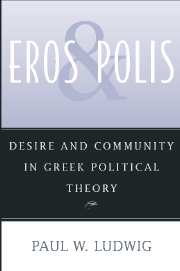Book contents
- Frontmatter
- Contents
- Acknowledgments and a Note on Citations
- Introduction
- PART ONE Political Eros: An Account from the Symposium
- ONE Statesmanship and Sexuality in Aristophanes' Speech
- TWO Law and Nature in Aristophanes' Speech
- PART TWO The Discourse of Political Eros
- PART THREE The Polis as a School for Eros
- List of Works Cited
- Index
TWO - Law and Nature in Aristophanes' Speech
Published online by Cambridge University Press: 10 December 2009
- Frontmatter
- Contents
- Acknowledgments and a Note on Citations
- Introduction
- PART ONE Political Eros: An Account from the Symposium
- ONE Statesmanship and Sexuality in Aristophanes' Speech
- TWO Law and Nature in Aristophanes' Speech
- PART TWO The Discourse of Political Eros
- PART THREE The Polis as a School for Eros
- List of Works Cited
- Index
Summary
Modern Contexts
Readings of Plato's Symposium, particularly of Aristophanes' speech in the dialogue, have played an increasingly important role in scholarly debates over the legal regulation of sexuality. The speech and the dialogue as a whole have served as points of reference in controversies between a liberal theorist (Nussbaum) and natural law theorists (Finnis and George), as well as figuring prominently in debates over the political ramifications of Foucault's theory of sexuality (e.g., Halperin, Boswell). At issue has been the justice of legally regulating sexuality, with arguments based on the naturalness or unnaturalness of homosexual desire as opposed to the social construction of eros generally. Of these readings, only that of a self-professed Foucauldian, Halperin, has enlisted Aristophanes' speech in support of the social construction of eros. Most other readers have been impressed by the naturalness of eros in the speech. Indeed, the myth of the circle-people would seem, on first view, to offer a taxonomy of desire based on our former biologies, in which all orientations arise naturally. Men seek men, women and men seek one another, and women seek women, in accordance with the other halves that have been predetermined for them by their original, unitary nature. As we shall see, however, readings that remain wholly naturalistic do so at the expense of ignoring a great deal of Platonic and Aristophanic context.
- Type
- Chapter
- Information
- Eros and PolisDesire and Community in Greek Political Theory, pp. 69 - 118Publisher: Cambridge University PressPrint publication year: 2002

